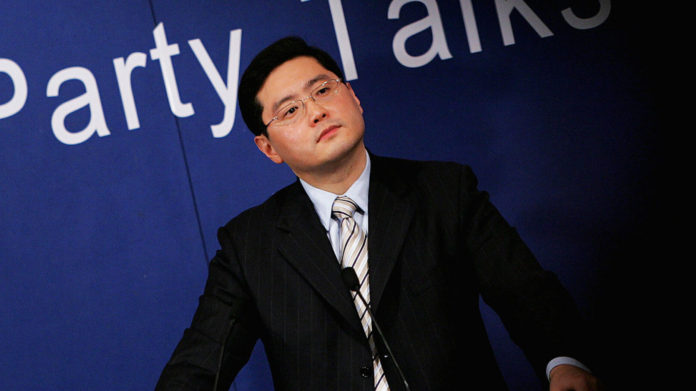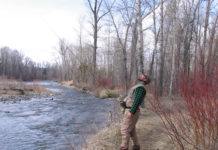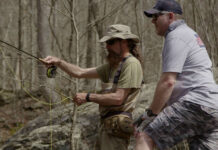The Aspen Security Forum is the kind of national security conference where you might ask Richard Moore, the completely unguarded head of MI6, to move out of the way so you can access the water cooler. It’s the kind of place where, at a happy hour in a sunny meadow high up in the Rockies, you could, beer bottle in hand, buttonhole Mike Rogers when he was still the head of the N.S.A., or corner Mikk Marran, the head of Estonian intelligence, as he’s holding a lunch wrap on a biodegradable plate, to ask what kind of information Vladimir Putin is really getting about the war. (And reader, I’ve done all three.)
It’s the kind of forum where former defense secretary Robert Gates just shuffles by you on a footpath, alone, looking not at the mountains ringing the forum, but at the pavement before him. It’s the kind of place where New York Times reporter David Sanger takes his administration sources fly fishing between panels. It’s where you can catch Glenn Simpson, the man who commissioned the Steele Dossier, drinking white wine and bitching familiarly to a very sympathetic David Ignatius, the Washington Post grandee, about yet another lawsuit Donald Trump has filed against him. In fact, the Aspen Security Forum is so disconcertingly chummy that, every year, the multi-day meeting kicks off with a dinner at Jane Harman’s chalet during which the disconcertingly avuncular John McLaughlin, the former deputy director of the C.I.A., typically entertains the guests—a collection of national security policy makers, think tankers, and journalists—with magic tricks.
Yes, everybody’s buddies at Aspen. The panels aren’t panels here. They’re fireside chats (in the middle of the day, in the middle of the summer, not a flame in sight). It’s a closed and hard-to-get-to space, both physically and metaphorically. You can’t fly direct from Washington, which is where most everyone is flying from, and getting that jigsaw of flights to line up just so takes some finesse. (Even Victoria Nuland, the powerful undersecretary of state for political affairs, had to have her panel moved after several of her flights were canceled and she had to spend the night in Dallas.) Only the national security select get invitations—or are given press passes. It is a small, and exceedingly clubby group. We’ve all known each other for years and years, crossing paths at conferences, on reporting trips and in various briefing rooms. If there are feuds or rivalries, they become muted in the thin mountain air.
Which is why the Chinese ambassador’s performance landed like a tactical nuke. Unlike the other guests, Qin Gang, Beijing’s envoy to the U.S., never cracked a smile nor a joke. He dispensed with the niceties or any semblance of diplomacy and proceeded to calmly but ferociously eviscerate American policy on China. He accused Joe Biden of fomenting a new Cold War with his rhetoric, which, Qin warned, would “build a new Berlin Wall” and “bring unbearable consequences to the world.” He accused Washington of “misinformation, disinformation, lies and malicious attacks.” He pushed back against the notion that the document Xi Jinping and Vladimir Putin signed on February 4 was an alliance (“It shows the two countries’ common opposition to Cold War mentality”) and said that war in Ukraine isn’t so black and white. (“The issue of Ukraine has historical and practical complexities,” Qin said. “It is a long story.”) He called for “an immediate ceasefire” (“sit down, calm down, and find a way out of [sic] situation”) and slammed the U.S. for its “double standard”: defending Ukraine’s territorial integrity but attacking China’s (i.e., insisting that Taiwan is a separate country).
He didn’t stop there. When asked about the genocide Beijing is carrying out against the Uyghurs in the Xinjiang region, Qin shot back that it was an anti-terrorism operation preventing the creation of another Islamic state. After a question from the deeply informed and deft Ed Luce, of the FT, about what the failure of the “one country, two systems” policy in Hong Kong meant for Taiwan, Qin shocked the largely American audience by quoting Abraham Lincoln: “A house divided against itself cannot stand.” In this warped analogy, Xinjiang, Taiwan, and Hong Kong were Alabama, South Carolina, and, say, Tennessee, trying to secede from the Union, and President Xi was waging a noble battle to keep his country unified and free of human bondage.
That last one really got people’s goats. Because if there’s one thing you can’t take away from even the most jaded American foreign policy elites, it’s their absolute sincerity. They believe in American ideals, in the supremacy of American values, in the good America offers the world, however ham-handedly it manages the delivery at times. (And to be fair, if the choice is between what the American government and the Chinese government are offering, it’s kind of a no-brainer.) That the representative of a totalitarian, repressive, genocidal Communist state should invoke an American saint on American soil to justify CCP policies was a bridge too far. (Two women in their seventies who were sitting near me were absolutely scandalized.)
But it wasn’t just the substance of what Qin said. It was the way he said it. He had come to a forum where everyone was friends and used his fireside chat to berate and attack them. Where everyone else was collegial and cheery, even when delivering stark warnings about, say, the world grain crisis, Qin was hostile and aggressive. Here was China’s wolf diplomacy on full display, its fangs bared and glinting in the Aspen sun.
World War III?
I caught the panel on a big screen in the Google Cloud tent set up in the resort’s central meadow, where some Russia hands like Susan Glasser, Peter Baker, Fiona Hill, and the Rockefeller Foundation’s Eileen O’Connor were all watching over lunch. Not that much got eaten. We all sat slack-jawed or pointing out one jab or another, like the lusty rage with which Qin said the “one” in “one China policy.” Some D.O.J. officials, including Matt Olsen, who is responsible for the January 6 investigations, were also watching, stupefied.
When the fireside chat was over, we all shared our impressions, which ranged from “holy shit” to “is this the prelude to World War III?”
We weren’t the only ones who had this reaction. For the next two days, as the Chinese entourage of young Foreign Ministry employees swanned around the Aspen Meadows Resort, all anyone talked about was Ambassador Qin. His performance was referenced in nearly every subsequent panel and fireside chat. Every off-site dinner and on-site lunch began and ended with some iteration of, “Holy shit, did you hear the Chinese ambassador?!” On my way back to Washington, while I was waiting for my bag on the tarmac in Denver, two women who were also coming from the forum asked me the same thing.
It wasn’t that people were angry at Qin. They were scared. In essence, he showed up at the high school dance and pulled a Carrie. Everyone had come prepared to talk about Russia and Ukraine and gas and grain, but along came Ambassador Qin to make sure that China received equal billing. They came prepared to talk about how to push back on Russia without triggering World War III, but Qin wanted them to know that it wasn’t Moscow who would bring that thunder, it was Beijing.
Even as he excoriated the Americans for mistakenly making China out to be a threat, he made sure that everyone understood that China would defend its interests and do so ferociously. Doing so at an elite symposium like the Aspen Security Forum was a smart and efficient way to deliver the message that China is angry and refuses to be ignored. What better way to get the conversation started than to attend a gathering of 200 of the most senior administration officials, think tankers, and the journalists who cover them, and put it to them as bluntly and unmistakably as possible? That, it seems, was very much the mission. And Qin completed it with flying colors.
When I got home that weekend, I was chatting with a source, a Republican foreign policy insider who is close with the likes of Henry Kissinger, who asked about how the Forum went and what was said. I told him that Qin was the runaway favorite, if one could call him that. “That’s great,” the insider said, to my surprise. “Because the sooner we wake up, the better the chances we can avoid the war.”
Credit: Source link































